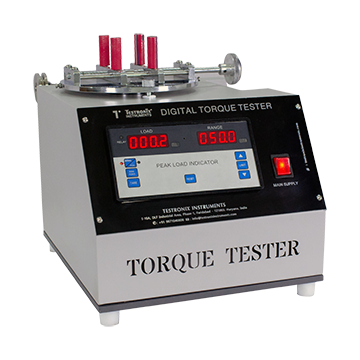Hello there! Are you familiar with the bottle cap torque tester? For a better understanding of the product, it is recommended to first learn about the tester. These devices are used in the beverage industry to measure the tightness of bottle caps. By applying torque to the cap, these testers ensure that the caps are properly sealed to prevent leaks and contamination.
Bottle cap torque testers are essential for maintaining product quality and safety. They help businesses meet regulatory standards and protect consumers from potential health hazards. Investing in a bottle cap torque tester saves your business time, money and reputation by ensuring that every bottle leaving your facility is properly sealed.
A bottle cap torque tester’s uses and capabilities
A bottle cap torque tester is a specialized piece of equipment designed for assessing the torque or rotational force required to open or close bottle caps. This essential quality control tool plays a critical role in various industries, including food and beverage, pharmaceuticals, cosmetics and chemical manufacturing.
In this article, the uses and capabilities of a bottle cap torque tester is explored, shedding light on its significance in ensuring product integrity and safety.
- Quality control
One of the primary uses of a bottle cap torque tester is quality control. It ensures that bottle caps are securely sealed to prevent leakage, contamination or tampering. By measuring the torque needed to open or close a cap, manufacturers can verify that caps meet their specified torque requirements. This is especially crucial in industries where product safety and integrity are paramount such as the pharmaceutical and food industries.
- Compliance
Regulatory bodies in various industries often mandate specific torque requirements for bottle caps to ensure product safety and quality. A bottle cap torque tester helps manufacturers comply with these regulations by providing a precise method for verifying torque levels. This is essential for meeting good manufacturing practices and other industry standards.
- Consistency
Bottle cap torque testers help maintain consistency in the manufacturing process. They ensure that every bottle cap is tightened or sealed to the same degree, reducing the likelihood of defects or inconsistencies in the final product. Consistency is key to meeting regulatory standards and customer expectations.
- Preventing over-tightening
Over-tightening bottle caps can lead to issues such as product spoilage and deformation of the cap or container. A torque tester helps prevent over-tightening by allowing manufacturers to set and monitor torque limits ensuring that caps are tightened to the appropriate level without excessive force.
- Detecting under-tightening
Under-tightening caps can result in leaks, contamination or inadequate product preservation. A bottle cap torque tester can detect under-tightening by measuring the torque required to open a cap. This helps manufacturers identify and address issues in the sealing process preventing substandard products from reaching the market.
- Research and development
In addition to quality control, bottle cap torque testers are invaluable in research and development. Manufacturers use these testers to assess different cap designs and closure systems determining the optimal torque requirements for their products. This ensures that caps are user-friendly while maintaining product integrity.
- Cap material testing
Bottle cap torque testers can be used to evaluate the performance of various cap materials, including plastic, metal and composite materials. By subjecting caps to torque testing, manufacturers can assess the durability and reliability of different materials under various conditions.
- Seal integrity
Beyond torque measurement, some advanced bottle cap torque testers can assess seal integrity by measuring the force required to break the seal. This is especially critical in industries like pharmaceuticals, where a compromised seal can have serious consequences.
- User-friendly design
Many bottle cap torque testers are designed to be user-friendly with intuitive interfaces that allow operators to easily set torque limits, record data and generate reports. This makes them accessible and practical for operators of varying skill levels.
Conclusion
To sum up, a bottle cap torque tester is a versatile and essential tool in various industries, contributing to quality control, compliance with regulations and product development. Accurately measuring the torque required to open or close bottle caps helps ensure that products are sealed securely, preventing leaks, contamination and other quality issues. As industries contribute to prioritizing safety, quality and consistency, the role of bottle cap torque testers remains indispensable in safeguarding both manufacturers and consumers.
Never compromise on quality – get a bottle cap torque tester today! If you are interested in learning more about bottle cap torque testers or want to explore different models, contact the proper source. Choose the right Lab testing instruments for your business needs!
FAQ:
What is a bottle cap torque tester?
A bottle cap torque tester is a specialized device used to precisely measure the amount of force, or torque, required to seal and open bottle caps. It is an essential tool in quality control processes to ensure that caps are properly sealed, preventing leaks and contamination.
How do you measure torque on a cap?
To measure torque on a cap, the bottle cap torque tester typically employs a gripping mechanism to secure the cap and then applies a controlled twisting force using either a motorized or manual mechanism. During this process, the tester records the resistance or torque needed to twist or open the cap, providing valuable data for consistent cap sealing and opening performance.
How much torque is required to open a bottle cap?
The torque needed to open a bottle cap can vary depending on factors such as the cap’s design, the material it’s made of, and the tightness with which it was initially applied. Striking the right balance is crucial: the cap should be tight enough to prevent leaks but not so tight that it’s challenging for consumers to open. Manufacturers often specify torque values for opening caps to ensure a positive user experience.
What is the torque for plastic caps?
The torque specifications for plastic caps also depend on factors like the type of plastic used and the cap’s specific design. Manufacturers establish these torque specifications during product development, conducting extensive testing to determine the optimal torque range that provides an effective seal while remaining user-friendly for opening.




